News
We’re excited to announce the dates for this year’s Seattle GNU/Linux
Conference: Friday, November 11 and Saturday, November 12, 2016.
We’re also happy that Seattle Central College will once again host us this
year.
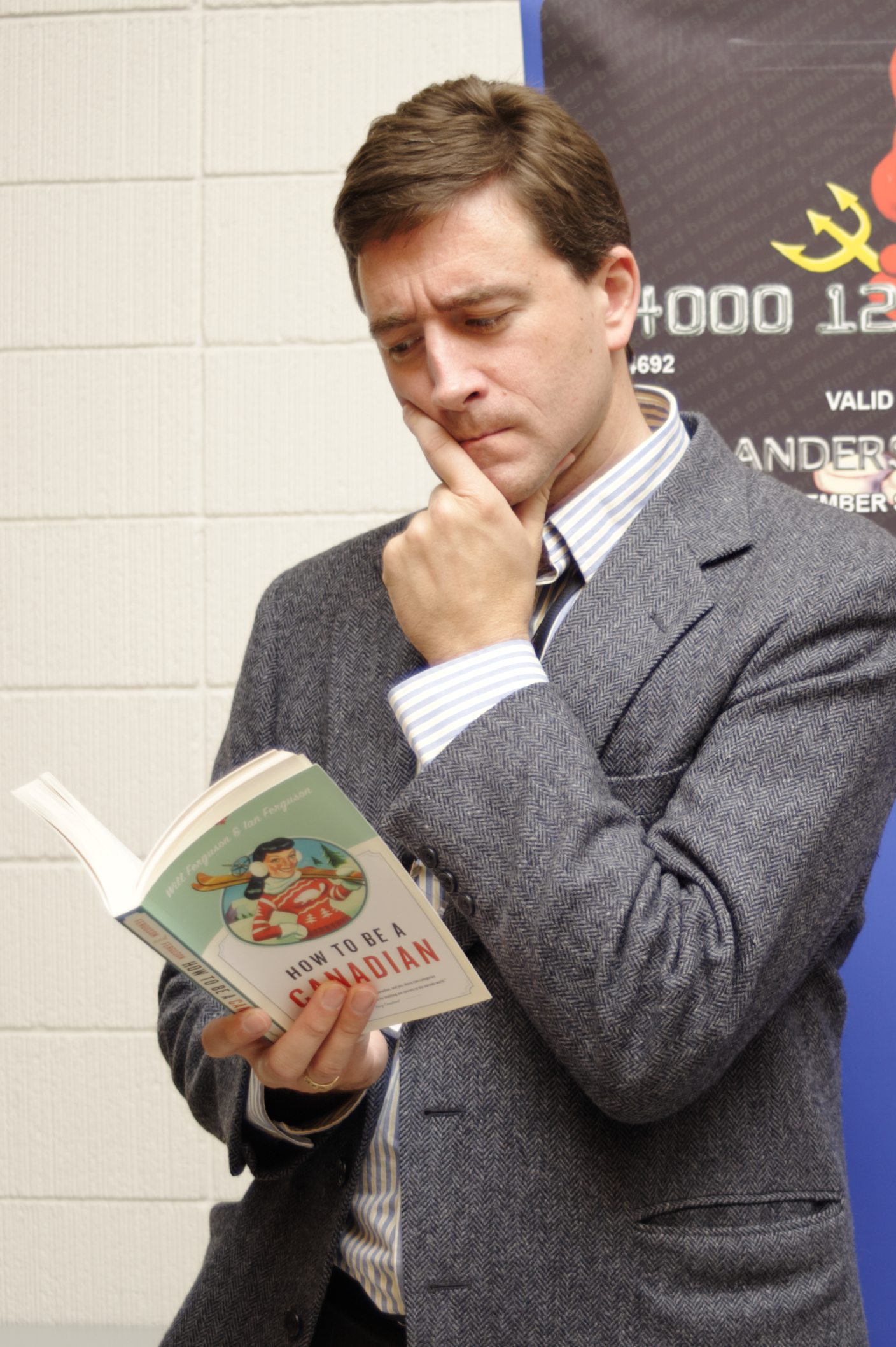
The Cascadia Community Builder Award recognizes a person who has made an
outstanding contribution to the free software movement in the Cascadia region.
The 2015 inaugural winner is Michael Dexter.
The award was given for the first time on Saturday, October 24th at the Seattle
GNU/Linux conference and is expected to remain a feature of the local event.
Michael was chosen because his work with the Portland Linux/Unix Group and the
BSD community exemplified the type of unsung community-building work that is so
critical to the growth of the free software movement.
Michael has used BSD Unix systems since January of 1991 and provides BSD and
ZFS support at Gainframe. He has supported BSD Unix with download mirrors,
events, and projects for over a decade and is best known for his virtualization
work. His advice for free software community activists is, “Trust your
instincts, ask lots of questions, and ignore the discouragement that will come
from every side.”
Michael was nominated by someone who got to know him through his tireless work
with the Portland Linux User Group. The nomination reads, “Michael has
organized over one hundred speakers for our two monthly meetings, including
Linus Torvalds, Bradley Kuhn, and Ward Cunningham.”
Michael received an engraved
multi-tool, made by the Oregon-based Leatherman company, that includes both a
bottle opener and a wire stripper – critical tools for every free software
community organizer. He will also be invited to participate in choosing
the recipient of future Cascadia Community Builder awards.
Nominations for the 2016 honoree will open next summer.
As we wrap up our third annual conference, we thank all of our speakers,
sponsors, volunteers, exhibitors, and attendees! Each year we see greater
community participation and record attendance numbers.
We’re also grateful to everyone who either invited friends to SeaGL or
spread the word through social media. Word of mouth is absolutely critical to
the success of our conference.
Special thanks goes to the staff at 500 East,
who hosted our keynote speeches and after-party.
Join our mailing
list
to get announcements about the 2016 conference.
We’d love your feedback! Tell us what you liked and what you’d like to see next
year:
See you in 2016!
Speakers:
If Google Hangouts works on your laptop and you want to livestream talks to the
SeaGL YouTube channel (they’ll also be automatically recorded by this
process), here are the directions!
1) Go to plus.google.com and log in with the account credentials provided by
an organizer.
2) Click the round avatar in the upper right, and select SeaGL from the list.
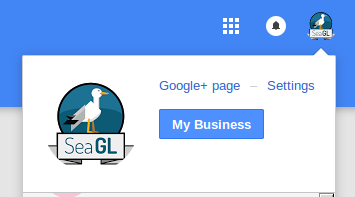
3) Click the “google+ page” link. You’re now on the SeaGL Google+ page.
4) In the upper left, click the “google+ page” button then select “hangouts”
from the menu which drops down.
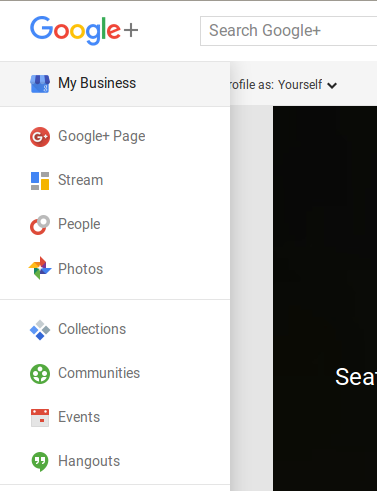
5) On the hangouts page, click “hangouts on air” (the middle link in the bar
at the top). Then click the big yellow “create a hangout on air” button.
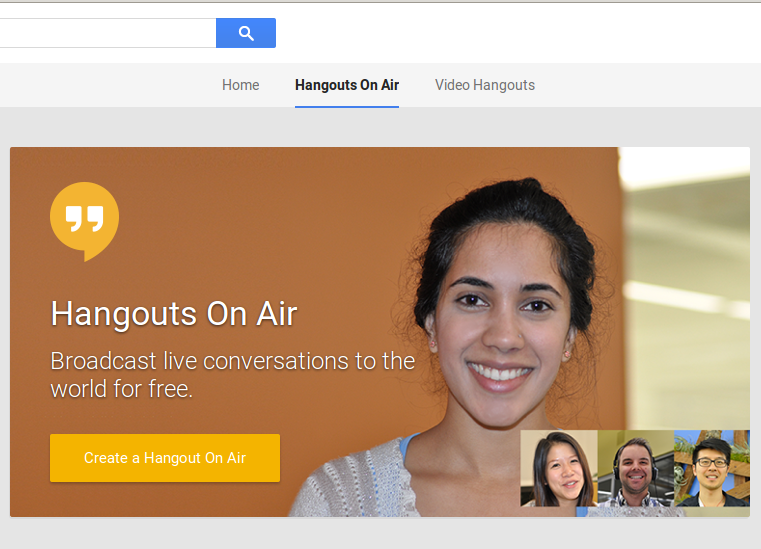
6) Put in your talk title, paste in your abstract if you have time, and click
the big green “share” button.
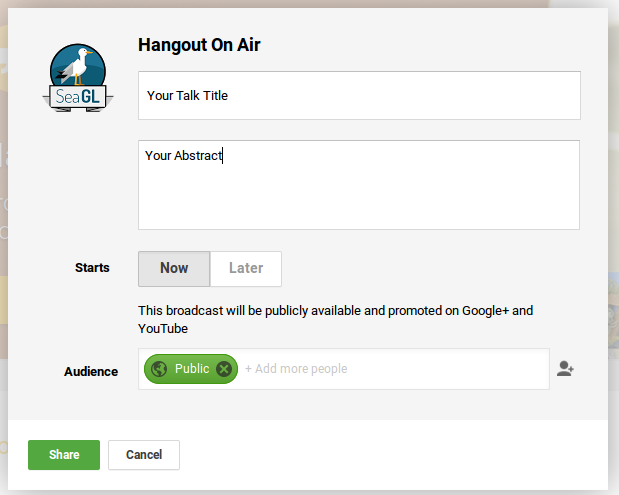
7) Click the big blue “Start” button.
8) When it tells you to invite guests, click “skip”.
9) Point your webcam at yourself and click the big green “start broadcast”
button at the bottom. Optionally, before you start the broadcast, use the
icons on the left of the hangout to share your screen.
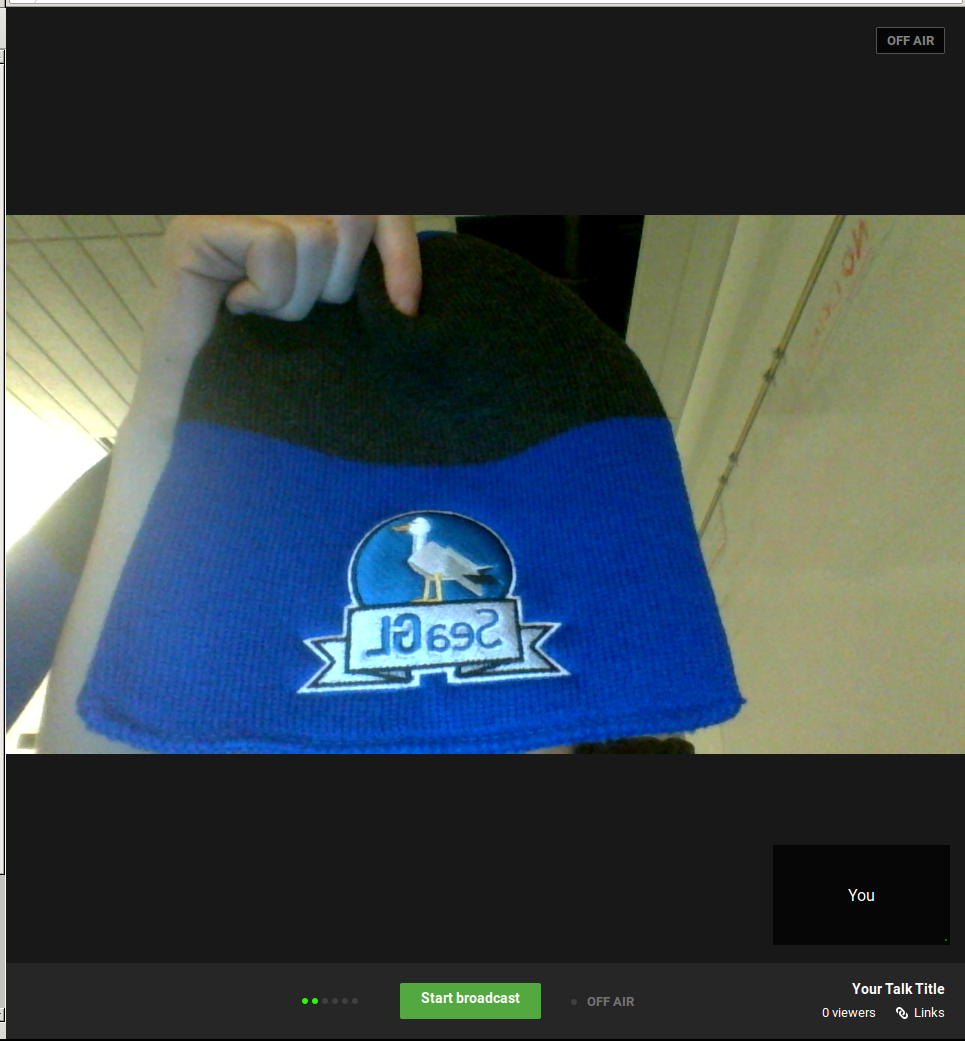
Talk recordings are available at https://www.youtube.com/seaglorg
Due to some logistical issues, we’ve had to move this year’s keynote speeches
off-site from Seattle Central College.
The keynotes will take place at 500 East, “a
social house” just a short walk from the school. Here’s the address:
500 E Pine St, Seattle, WA 98122
Here’s the Saturday afternoon schedule:
| Time |
Event |
| 1:30 - 2:30 p.m. |
Last batch of talks at the school |
| 2:30 - 3:00 p.m. |
Everyone moves to 500 East |
| 3:00 - 4:00 p.m. |
Shauna Gordon-McKeon’s talk and the Cascadia Builder Award presentation |
| 4:00 - 6:00 p.m. |
Richard M. Stallman’s talk |
| 6:00 p.m. |
Bar opens and attendees can mingle |
Keynote speaker Shauna Gordon-McKeon talks to SeaGL:
Q: Could you please introduce yourself and tell us a little about your
background?
My name’s Shauna Gordon-McKeon, and my background is in the sciences. I was a
neuroscience researcher for several years during and after college, and that’s
when I first started writing software, and understanding the difference
between free and proprietary software. I didn’t leap into the free software
community right away, though - I was more focused on open data and open
knowledge. I started doing community organizing around government transparency
and around open access to scientific research, and as I learned more about
software I saw how FOSS fits in with that. To me, they’re all manifestations
of the same core values - the belief that individuals have a right to
information about the world around them, whether that’s the results of an
experiment or data about policing or what exactly a program is doing when you
run it on your computer.
Q: Without tipping your hand on the actual talk, can you give us an
idea of what we might expect?
I already did! Above, I mentioned the “core values” that draw me to free
software. My talk is going to be highlighting the values that matter to the
free software community - how individuals can follow their values to find
meaningful ways to contribute, and how we as a community can grow in alignment
with those values.
Q: Is this your first visit to SeaGL? If so, what are your expectations? If
not, can you give us your impressions of the event?
This will be my first visit to SeaGL, and I’m looking forward to it. I’ve
heard wonderful things! I enjoy smaller conferences a great deal - they’re
less rushed, and it’s easier to connect with new people. I hope to have some
great conversations with members of the community, and to be back next year.
Free Software Foundation staffer Georgia Young will speak at SeaGL this
weekend:
Q: Could you please introduce yourself and tell us a little about your
background?
My name is Georgia Young. I am the program manager for the Free Software
Foundation and live in the Boston area. I joined the FSF in January as
outreach and communication coordinator, had previously worked on
LibrePlanet in 2014, and took on my new role this past summer. My job
includes event management, writing about free software issues,
connecting with the free software community, and fundraising to sustain
the FSF’s work. I’m also a musician.
Q: Without tipping your hand on the actual talk, can you give us an
idea of what we might expect?
This is my first free software talk, and I wanted to introduce people to
a great free software program that is licensed under the GNU General
Public License, a free software license written by Richard Stallman and
administered by the Free Software Foundation.
I discovered Scribus around 2009, when I was in graduate school. Much of
my professional experience is in the publishing industry, where nonfree
programs reign. I wasn’t consciously thinking about Free as in Freedom
when I chose Scribus, but the idea of software that was effective but
not created by huge corporations like Adobe or Microsoft inherently
appealed to me.
Twelve years after its initial release, I feel like Scribus deserves
more attention than it gets. My aim is to get people interested in using
this program for their own documents, and to get them thinking about
freely licensed fonts, and other free software programs that can be used
in concert with Scribus.
Q: Is this your first visit to SeaGL? If so, what are your expectations? If
not, can you give us your impressions of the event?
It’s my first visit to SeaGL, to Seattle, to the Pacific Northwest in general!
I’m looking forward to seeing a few familiar faces, meeting lots of new
people, and hearing other great ideas arising from the free software
community.
Q: If attending your talk inspires others to present at a conference, what
can they do?
A: Talk to me or visit the Free Software Foundation table in the exhibit hall
for more information about submitting a proposal to LibrePlanet, the FSF’s
annual free software conference in the Boston area, March 19-20, 2016!
Speaker Gareth J. Greenaway talks SaltStack and ChatOps:
Q: Could you please introduce yourself and tell us a little about your
background?
Absolutely! I’m Gareth J. Greenaway, I’m a semi-native Southern Californian.
Semi-native because while I’ve lived in SoCal most of my life I was born in
Auckland, New Zealand. I’ve been a member of the free & open source community
for just over 20 years. The two major contributions I’ve been able to bring
to the FOSS community are being one of the co-founders and organizers of the
Southern California Linux Expo (SCALE) and the 2+ years I’ve been actively
contributing to the SaltStack project.
Q: Without tipping your hand on the actual talk, can you give us an
idea of what we might expect?
I’m going to be talking about SaltStack and how it can fit into the ChatOps
movement. Chatops, like DevOps, is a very subject term and means something
different to everyone. I’m a fan and a believer of the definition that
originally came out of Github, putting the tools in the middle of the
conversation. Because of the way SaltStack was designed, it’s extremely
flexible and extendable. It lends itself to fit nicely into this paradigm.
The talk will, hopefully, illustrate a lot of these concepts to the attendees.
Q: Is this your first visit to SeaGL? If so, what are your expectations? If
not, can you give us your impressions of the event?
This will be my second year attending and speaking at SeaGL. As an event
organizer it’s always a unique experience attending events that you’re not
responsible for. It’s definitely a good experience being able to watch the
organizers run around like crazy making sure everything goes off how it show,
especially knowing what it takes to do so. Knowing all this, I was impressed
with SeaGL as a show ad the organizers. It made my nostalgic for the past
SCALE events and I’m excited to see how SeaGL continues to grow in the coming
years.
SeaGL speaker and staff member Deb Nicholson talks software patents:
Q: Could you please introduce yourself and tell us a little about your
background?
My name is Deb Nicholson and I work at the Open Invention Network
OIN. OIN is a defensive patent pool for
lots of free and open source projects, including Linux, GNU, Android and a ton
of other tools. I also serve as the Community Manager for
GNU MediaGoblin, a decentralized media-hosting
project, and as a board member at OpenHatch https://openhatch.org/, which we
like to call “Free Software’s Welcoming Committee.”
Q: Without tipping your hand on the actual talk, can you give us an
idea of what we might expect?
Well, we’ve seen some really big changes to the patent landscape in a short
amount of time. In the US, we went from almost no software patents to an
exponential increase in patenting in computing which lead to a huge uptick in
software patent aggression. For a while, it seemed like nothing could be done
but there’s been lots of progress; both in community awareness and
understanding what can be done. Finally, the Supreme Court addressed the scope
of patentability twice last year and I’ll talk about how that is affecting
cases around the country.
Q: Is this your first visit to SeaGL? If so, what are your expectations? If
not, can you give us your impressions of the event?
I’ve been to every single SeaGL since I’m also one of the organizers, which
is a little weird since I live in Boston. I blame the rest of the amazing
SeaGL team and the ridiculously good Seattle coffee. So I’m probably a little
biased, but I think we put on a great conference for beginners, hobbyists,
activists and long-time free software users.
Q: Aren’t legal issues sort of boring for the layperson?
A: Not at all! Software patent cases involve actual people trying to change
the way the law treats our community and our industry. Some of those people
are heroic, others are craven bullies, and some are just trying to make the
best of a bad situation. Toss in ridiculous piles of money and there’s easily
enough drama for a TV show.
SeaGL talks with speaker Corey Quinn:
Q: Could you please introduce yourself and tell us a little about your
background?
Sure! I head up the DevOps group at FutureAdvisor in San Francisco. I’m fairly
active in the open source community personally – I helped run the freenode IRC
network for over five years, I was one of the (very) early developers behind
SaltStack, and I’ve made it a point to build my team around the ethos of
giving back to the larger community. To be more direct, a job requirement here
is to contribute in some way to the larger community, be it through
contributions to open source software, writing blog posts, or tricking people
like you into letting people like me speak at community-oriented conferences
against your better judgement.
Q: Without tipping your hand on the actual talk, can you give us an
idea of what we might expect?
I’ve seen a lot of talks over the years that are fantastic technical
resources, but the audience wasn’t particularly engaged, either due to a lack
of understanding of the material, or a lack of ability for the presenter to
paint a picture of what their technology actually did. To talk about a complex
subject like git almost requires that the talk be entertaining first, and
educational second. So let’s just say that my talk is likely to be…
nontraditional.
Q: Is this your first visit to SeaGL? If so, what are your expectations? If
not, can you give us your impressions of the event?
I was at SeaGL last year, and it was absolutely one of the best conferences
I’ve had the privilege of attending. People were extremely welcoming, the
talks were interesting, and it was just a first class event all around.





